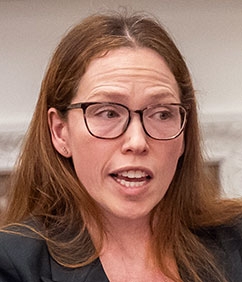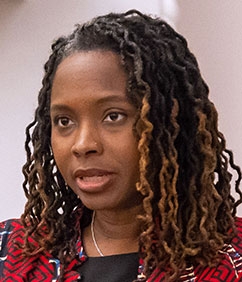Panel explores efforts to monitor prosecutors in New York at Thompson Lecture
Expanding the oversight of New York prosecutors was the focus of the sixth annual Kenneth P. Thompson ’92 Lecture on Race and Criminal Justice Reform on February 27. Co-hosted by the Peter L. Zimroth Center on the Administration of Criminal Law, the event is held in tribute to its namesake, the late Kenneth P. Thompson, who served as Brooklyn’s first Black district attorney.
The Thompson Lecture—which took the form of a panel discussion—featured Susan Friedman, inaugural administrator of the New York State Commission on Prosecutorial Conduct (CPC), and Nicole Smith Futrell, professor of law at the City University of New York and a co-founder of Accountability New York, a coalition of attorneys, law professors, and community members that seeks professional consequences for abuses of prosecutorial power. The conversation was moderated by Courtney Olivia, executive director of the Zimroth Center.
In 2018, New York Governor Andrew Cuomo signed legislation that established CPC as the nation’s first commission to probe complaints of prosecutorial misconduct. A significant number of the 250 wrongful convictions that had then been identified in New York State were linked to the actions of prosecutors, according to a report by the Innocence Project. Under its mandate, the 11-member commission can investigate claims of prosecutorial misconduct and can make referrals to one of New York State’s four Attorney Grievances Committees. Accountability New York, launched in 2021, has filed grievances on behalf of clients and created a website that spotlights misconduct complaints.
While both campaigns have met resistance from local DA groups, Futrell defended her group’s work as an independent monitor of prosecutors in the metropolitan area. “There are prosecutors who try to do their jobs with integrity and live up to the highest standards, but we have also seen the numbers in terms of wrongful convictions,” she said. “Prosecutors have tremendous power, and with that comes a high degree of responsibility. Who’s holding them to account for that?”
In their discussion, Friedman and Futrell described what constitutes prosecutorial misconduct, addressed whether district attorneys could be relied upon to help identify bad actors, and weighed the effectiveness of New York judges and elected officials in providing oversight.
Selected remarks from the discussion:
Susan Friedman: “Oversight is hard for everybody. Nobody likes it. And I think that’s especially true when we operate in a legal system that focuses on blame and punishment...Because there’s this general resistance to any kind of oversight, that puts a responsibility on the commissioners—and on me—to make sure that we get it right and take the steps to show that we are going to engage in this process in a fair way. And that hopefully will start to change the culture.” (video, 42:02)
Nicole Smith Futrell: “I do think it is an opportunity to have a little bit more policy-systemic examination of these various offices. I think what that butts up against sometimes is this culture or perception of [prosecutorial] infallibility—that they kind of get it right all the time, or there’s just moral conviction such that if you let down that veneer at all, it threatens the entire endeavor. And I appreciate that many offices have now started to develop conviction integrity units and are open to collaborating on some cases that reflect wrongful conviction, but I think it does have to go a little bit further.” (video, 56:07)
Watch video of their discussion:
Posted May 19, 2025



